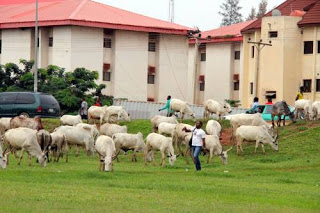 |
| file photo |
Fulani herdsmen in Benue and Nasarawa
states are asking for more time to move to grazing reserves – with
support from the Federal Government.
states are asking for more time to move to grazing reserves – with
support from the Federal Government.

This appears to be a request by the herders to be granted temporary respite from the Benue State anti-open grazing law.
The
herdsmen killed more than 73 people, mostly women and children, in
Ayilamo, Gaambe-Tiev, in Logo Local Government Area and Tom-atar, Saghav
Ward of Guma Local Government Area on New Year day.
herdsmen killed more than 73 people, mostly women and children, in
Ayilamo, Gaambe-Tiev, in Logo Local Government Area and Tom-atar, Saghav
Ward of Guma Local Government Area on New Year day.
The
herders told the Federal Government subcommittee on reconciliation in
the zone led by David Umahi, the Ebonyi State governor, that they were
willing to obey the laws of their states of residence but were waiting
for a Federal Government-assisted solution to their grazing dilemma.
herders told the Federal Government subcommittee on reconciliation in
the zone led by David Umahi, the Ebonyi State governor, that they were
willing to obey the laws of their states of residence but were waiting
for a Federal Government-assisted solution to their grazing dilemma.
Umahi
told journalists at the Benue Peoples’ House, Makurdi, on Tuesday, that
it had been agreed that undocumented herdsmen from foreign countries
must henceforth get papers before they would be allowed into the
country.
told journalists at the Benue Peoples’ House, Makurdi, on Tuesday, that
it had been agreed that undocumented herdsmen from foreign countries
must henceforth get papers before they would be allowed into the
country.
(adsbygoogle = window.adsbygoogle || []).push({});
On
the controversial Fulani claims to the Benue valley by right of
conquest, Governor Umahi said the issue was never brought up by the
herders during the meetings the sub-committee had with them, so it
should be discarded.
the controversial Fulani claims to the Benue valley by right of
conquest, Governor Umahi said the issue was never brought up by the
herders during the meetings the sub-committee had with them, so it
should be discarded.
The
sub-committee also is working towards the dissolution of all militias
as one of the planks of peace-building in the affected states.
sub-committee also is working towards the dissolution of all militias
as one of the planks of peace-building in the affected states.
“All
parties are committed to a ceasefire,” Umahi said, and added that “we
will disarm militia and support security chiefs to ensure that the
disarming process was successful.”
parties are committed to a ceasefire,” Umahi said, and added that “we
will disarm militia and support security chiefs to ensure that the
disarming process was successful.”
The subcommittee was set up by the Office of Vice President Yemi Osibanjo to visit states affected by the crisis.
It is expected to find ways of ending the clashes between herdsmen and farmers in Benue and other states in the zone.
Umahi ruled out the option of seeking cancellation of the anti-open grazing law as some people have suggested.
He
said the subcommittee gathered that the Benue people were “passionate
about their law”, and that the law was beyond the state governor, Samuel
Ortom.
said the subcommittee gathered that the Benue people were “passionate
about their law”, and that the law was beyond the state governor, Samuel
Ortom.
(adsbygoogle = window.adsbygoogle || []).push({});
He
also said it was agreed that Benue had the right to make its laws and
that anyone that was staying on Benue soil must obey the laws of the
land.
also said it was agreed that Benue had the right to make its laws and
that anyone that was staying on Benue soil must obey the laws of the
land.
Umahi
said all stakeholders also agreed that where a law did not favour
anyone they should dialogue with the state to find a workable solution.
said all stakeholders also agreed that where a law did not favour
anyone they should dialogue with the state to find a workable solution.
The
governor pointed out that stakeholders agreed that the Federal
Government “must see animal husbandry as an economic venture”.
governor pointed out that stakeholders agreed that the Federal
Government “must see animal husbandry as an economic venture”.
They
have, therefore, called for incentives for the herdsmen, similar to the
anchor programme for farmers and other programmes for other players in
the economy.
have, therefore, called for incentives for the herdsmen, similar to the
anchor programme for farmers and other programmes for other players in
the economy.
He
said during the meetings that were held, it was also agreed that in
states where there was no land for grazing, they should ranch.
said during the meetings that were held, it was also agreed that in
states where there was no land for grazing, they should ranch.
The
governor disclosed that there were over 117,771 children, men, and
women in seven of the Internally Displaced Persons (IDPs) camps in
Benue.
governor disclosed that there were over 117,771 children, men, and
women in seven of the Internally Displaced Persons (IDPs) camps in
Benue.
He
said 80 percent of the IDPs were children ages seven and eight, and
noted that they were “living in very deplorable conditions.”
said 80 percent of the IDPs were children ages seven and eight, and
noted that they were “living in very deplorable conditions.”
Umahi
said the subcommittee found out that out of the over 20,000 IDPs in
Nasarawa, 20,000 of them were from the Tiv extraction whose homes were
either burnt down by herdsmen or who had left their homes out of fear of
being attacked.
said the subcommittee found out that out of the over 20,000 IDPs in
Nasarawa, 20,000 of them were from the Tiv extraction whose homes were
either burnt down by herdsmen or who had left their homes out of fear of
being attacked.
Lamenting
the plight of the IDPs, Umahi called on the Federal Government to
dispatch the National Emergency Management Agency (NEMA) to Benue to
evaluate the situation at the camps and see how they could immediately
come to the aid of the displaced persons.
the plight of the IDPs, Umahi called on the Federal Government to
dispatch the National Emergency Management Agency (NEMA) to Benue to
evaluate the situation at the camps and see how they could immediately
come to the aid of the displaced persons.
Umahi said the next meeting would be on a representative level.










